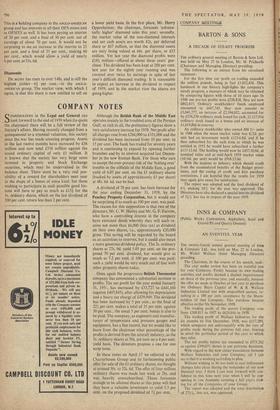COMPANY NOTES
SHAREHOLDERS in the Legal and General can look forward to the end of 1959 when (to quote the chairman) there will be a full review of the Society's affairs. Having recently changed from a quinquennial to a triennial valuation, this society since the war has made amazing progress. Assets in the last twelve months have increased by £36 million and now total £358 million against the issued ordinary capital of only £1 million. It is known that the society has very large sums invested in property and Stock Exchange securities, which may be undervalued in the balance sheet. There must be a very real pos- sibility of a reward for shareholders next year in the shape of a bonus of some kind; but those wishing to participate in such possible good for- tune will have to pay as much as £13+ for the 5s. ordinary shares, which on the last dividend of 100 per cent, return less than 2 per cent. Although the British Bank of the Middle East operates mainly in the troubled area of the Persian Gulf, so rich in oil, the preliminary figures show a very satisfactory increase for 1958. Net profit after all charges rose from £266,000 to £331,000 and the dividend has been increased from 10 per cent. to 15 per cent. The bank has traded for seventy years and is continuing to expand by opening further branches and by its interest acquired last Decem- ber in the new Iranian Bank. For those who care to accept the ever-present risk of the 'boiling over' trouble in the oilfields of the Middle East, a good yield of 6.05 per cent, on the £1 ordinary shares (backed by assets of approximately £5 per share) at 48s. 6d. xd. can be had.
A dividend of 70 per cent, has been forecast for the year ending December 31, 1959, by the Peachey Property Corporation, but it would not be surprising if as much as 100 per cent, was paid. The reason for this supposition is that two of the directors, Mr. C. W. Hutley and Mr. G. F. Farrow, who have a controlling interest in the company have executed deeds whereby they will each re- ceive not more than £6,000 (less tax) as dividend on their own shares, i.e., approximately £20,000 gross. This saving will be regarded by the board as an accretion to reserves, but it could also mean a more generous dividend policy. The 2s. ordinary shares at 27s. 9d. yield 5.05 per cent. on the pro- posed 70 per cent. dividend, but would give as much as 7.2 per cent. if 100 per cent, was paid; such a yield would be very much out of line with other property shares today.
Once again the progressive British Thermostat company has announced a substantial increase in profits. The net profit for the year ended January 31, 195: ;, has increased by £53,727 to £441,160 (against £407,845), after allowing for depreciation and a heavy tax charge of £429,949. The dividend has been increased by 5 per cent., as the final of 22f per cent, makes a total of 35 per cent. against 30 per cent.; the usual 5 per cent, bonus is also to be paid. The company, as engineers and manufac- turers of temperature and pressure gauges and equipment, has a fine record, but we would like to learn from the chairman what percentage of the profits is derived from the aircraft industry, as the 5s ordinary shares at 50s. are now on a 4 per cent. yield basis. The directors propose a one for one scrip issue.
In these notes on April 17 we referred to the Charterhouse Group and its forthcoming public offer for sale of the £1 ordinary shares, we thought at around 30s. to 32s. 6d. The offer of four million ordinary shares was made last week at 28s. and was heavily oversubscribed. Those fortunate enough to be allotted shares at this price will find they have a valuable investment to yield 5.3 per cent, on the proposed dividend of 71 per cent.














































 Previous page
Previous page